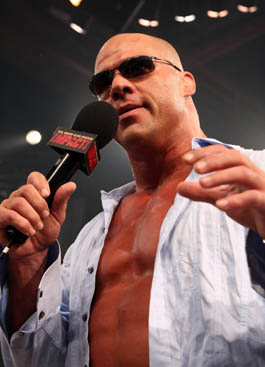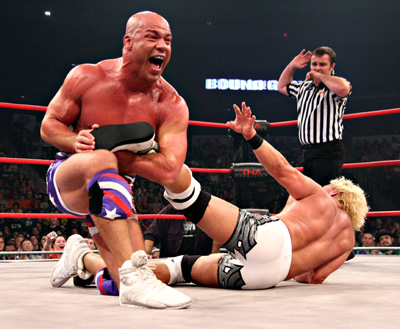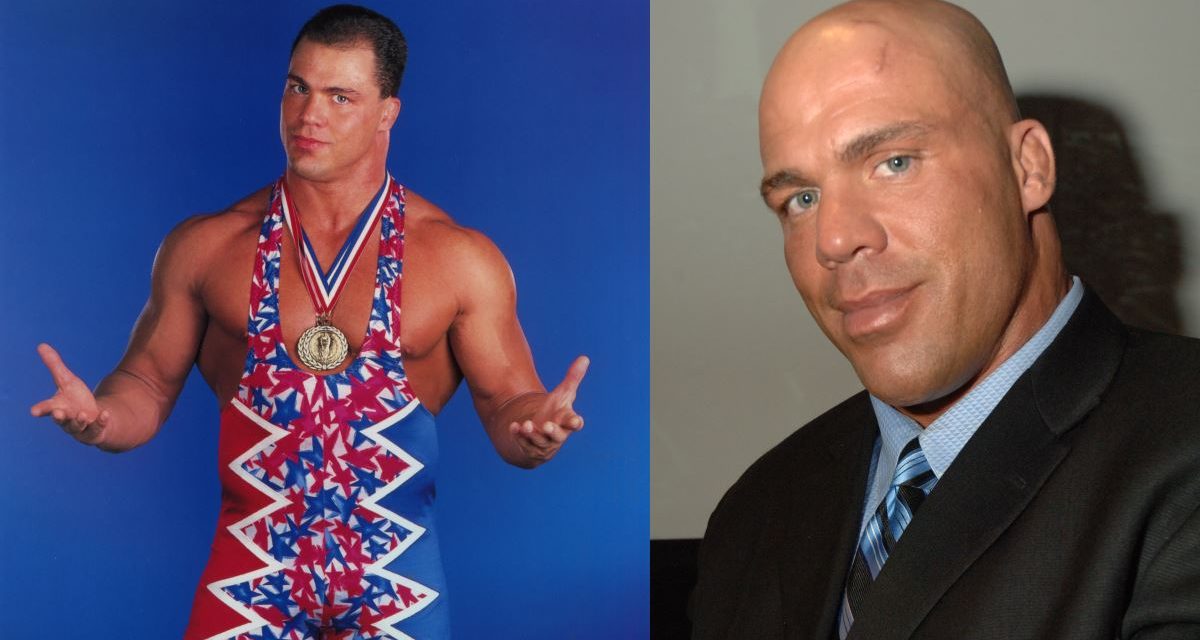Kurt Angle has a special place in his heart for Detroit. During his first few months in wrestling, he main evented a house show at the Joe Louis Arena in downtown Detroit against Triple H. He remembered the arena being full and his payoff, for the January 2, 1999 house show as being “unreal for just a house show.”

Kurt Angle addresses the audience. Photos courtesy TNA.
“Detroit is more than a hockey town,” Angle told SLAM! Wrestling this week. “It’s amazing how loyal the fans are. They make me want to put out a four-star match everytime I come, and this Sunday will be no different.”
Angle will main event TNA’s Slammiversary pay-per-view at the Palace of Auburn Hills in suburban Detroit on Sunday. He is part of the “King of the Mountain” match for the TNA World Heavyweight championship with Mick Foley, Jeff Jarrett, A.J. Styles and Samoa Joe.
The world has seen a rapid growth in mixed-martial arts (MMA), with many amateur wrestlers passing up a world in professional wrestling for a life in MMA. Angle, who was an amateur wrestler and 1996 Olympic gold medalist in the sport, explained why this could be.
“You are dealing with two different animals,” Angle said comparing professional wrestling and MMA. “You have to be crazy to do both. You have to have a certain talent to be a professional wrestler. There is an art form and psychology to it that is different than any sport of form of entertainment.”
Angle has had the unique opportunity to train in amateur and professional wrestling as well as MMA, although he never fought in an MMA fight. “Both are brutal but you train all the time for maybe two MMA fights a year. In wrestling, you are fighting every week, every year, for years and years. Nothing is more brutal than taking 20 bumps in a ring on plywood.”
He conceded that “MMA is the toughest sport,” but Angle did mention that wrestling was considered sports entertainment. Wrestling is a different form of entertainment with year round abuse of the body. “I have seen great amateur wrestlers and MMA fighters not able to last when training for professional wrestling.”
Wrestling has had its problem with drug abuse and deaths over the past two decades. Angle is no different, calling himself a “junkie” for abusing pain medication for two years while with the WWE.
“The bumps take a huge toll on people’s bodies.” Angle said that pills were an easy way out. “Guys used to take drugs, both recreational and medical, to ease the pain. And the WWE has done a good thing to open up drug rehab for all current and past stars.”
Angle thinks that this plus the mass amounts of injuries and deaths due to wrestling will seem a change in the decades to come. “The young wrestlers of today have seen all these problems. Their idea of a good time isn’t drinking, partying, doing drugs, it’s playing video games all night.”
With any addiction, it starts off slowly and builds till it’s out of control. Angle was no different. He started with regular doses but later was up to 65 a day. The mix of Percocet, Vicodin, Norco and Lorcet would be one of the factors that cost Angle his job with the WWE in 2006. He went clean and signed with TNA, thus saving himself from being another statistic.
“It’s unfortunate that there are a large number of deaths of wrestlers, but the industry has taken great steps to eliminate these problems with wellness and drug policies.”
When asked if he thought there was enough regulation by the companies in terms of safety in the ring, Angle thought so. “Safety is always first. And the companies always tell us to ‘pull back’ if they believe certain moves are a safety problem.”
 Kurt Angle twists the ankle of Jeff Jarrett. |
Angle called the recent in-ring death of Mitsuharu Misawa “freakish” and that Misawa “put his life on the line and lost.” Angle questioned the injury of Misawa and if that could have played a part in the death. “He may have had a past heart problem or injury and just aggravating was what killed him. It’s sad.”
“What happens when you make a superstar? You spend time and money in the star. What’s the worst thing that could happen? Fans want to pay to see the star wrestler and appear. You don’t want them to get hurt or worse yet die.”
TNA comes to the Palace of Auburn Hills this Sunday for Slammiversary pay-per-view. Tickets start at $7.00. Tickets can be purchased at Ticketmaster outlets or check TNAWrestling.com for more information.
FEATURED LINK

